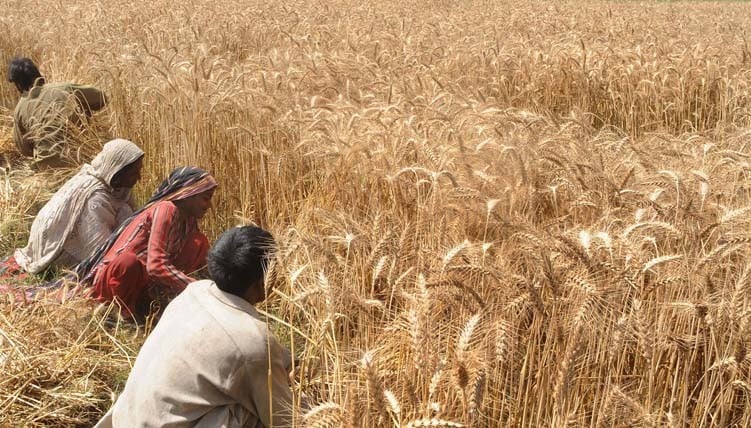
Despite a bumper wheat crop this year, farmers are in a fix as the government fails to procure the produce in time

Muhammad Azam, a farmer in Rahimyar Khan, is worried about selling his own and his brother’s wheat crop at the procurement centre established by the government of Punjab. Each brother owns 8 acre of agricultural land where they grew wheat. "Though we had harvested our crop three weeks ago, we are still unable to get gunny bags from the procurement centre," Azam tells TNS. "Farmers like us just want to sell our grain on time but at the price set by the government which is Rs1300 per 40kg."
"We desperately need to sell our wheat so that we can have enough money to sow cotton and pay off our debts as well," Azam says. "The procurement centre of Punjab Food Department (PFD) has not released gunny bags to a lot of farmers, including us. We have been told that the Punjab Land Records Authority (PLRA) has yet not completed the process of scrutinising the proprietorship of claimants."
Most of the needy and exasperated farmers have sold their grain in the open market either to middlemen or the seed companies at the price of around Rs1000 to Rs1100 per 40kg. However, a large number of farmers are still waiting in a hope to get a better price for their produce.
According to the Punjab Food Department’s 2018/19 wheat procurement policy, 382 procurement centres have been established in the province. Owners of lands up to ten acres are entitled to apply for gunny bags, however, the submissions will be scrutinised by the members of PLRA at procurement centres through verification of girdawari growers’ list and ownership records. The issuance of gunny bags to the legitimate applicants must start from April 22 after the completion of inspection.
"This policy looks decent on papers but ground realities tell a different story," Central Secretary General Pakistan Kissan Ittehad Mian Umair, based in Multan, tells TNS. "The procedure of scrutiny is truly an act of belittling the farmers and offering black marketers an opportunity to exploit farmers."
"Moreover, four to six gunny bags per acre are being provided by the procurement centres to farmers which is a joke," Mian Umair states, explaining "6 bags can contain maximum 600kg out of around average 2200kg per acre this year."
"Four million tons is our set target of procuring wheat this year. Therefore, it is impossible to facilitate every grower," Punjab Food Minister Bilal Yaseen tells TNS, adding facilitating small growers is our main concern. Committees at district level are working to make the procurement process horizontal, tackling the grievances of farmers. "Having PLRA on board is to snub the middleman so that the actual benefit should be delivered to farmers," the minister says.
"More glitches for cultivators and supplementary openings for the middlemen have increased since the PLRA has stepped in the process of issuance of gunny bags," says Mian Umair. "Now, growers are more vulnerable since the procedure of securing gunny bags is more intricate and time-taking. Moreover, bags available for farmers are insufficient."
What is wrong with the PFD’s new policy regarding farmers who own 10 to 25 acre? "Actually, the message is that the farmers must stop cultivating wheat now otherwise it’s their headache to dispose off the crop," says Lahore-based Director Farmers Associates of Pakistan Rabia Sultan. "Shortage of water has already damaged the wheat crop this year, and the same is going to happen with cotton but the government is behaving indifferently."
Pakistan Agriculture Storage & Services Corporation (PASSCO) is another department which has started procurement process on April 30 in Punjab. PASSCO is already procuring wheat in Sindh. "PASSCO has established 230 procurement centres to secure 900,000 metric ton from both Sindh and Punjab provinces," senior Procurement Officer PASSCO Imran Khalid tells TNS. Process of balloting is introduced for the first time to allocate gunny bags because PASSCO has to provide bags according to the set goal.
"Balloting means that growers have to be in the waiting list which is annoying for small farmers as they do not have any place to store their crop," says Sargodha-based leader of Kissan Ittehad Council Chaudhry Muhammad Mohsin. "Procuring wheat at the end of April is a dishonest step because ninety per cent small growers have already sold out their crop in the open market at a low price."
Pakistan is the Asia’s third major wheat grower. Procuring 26.5 million metric tons wheat is the target for 2018 set by government of Pakistan. According to United States Department of Agriculture (USDA), Pakistan is going to have record wheat production in this fiscal year. In last December, the Cabinet Committee had set the target to export two million tons of wheat in the fiscal year. Nevertheless, most of the wheat has been exported to Afghanistan as Pakistan has yet not explored new markets because of its expensive procurement in the country.
"If the inputs like seed, diesel, electricity, and fertilizers keep on getting costlier, the cost of wheat production would go higher than other countries in the region," says Rabia Sultan. "Once in a blue moon, the government reduces tax on fertilizers and calls it ‘subsidy’ which appears ludicrous. If the government wants to boost the agriculture sector, especially small growers, efforts must be made to cut the cost of inputs."